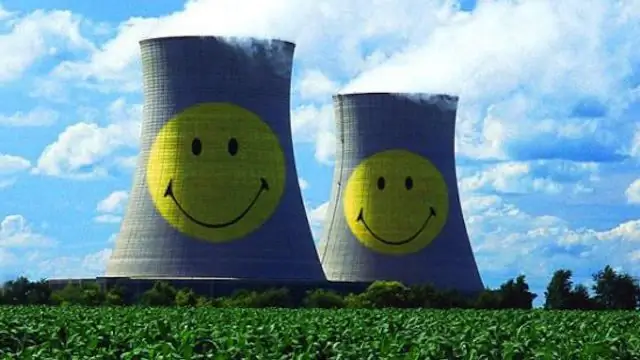2026 Author: Howard Calhoun | calhoun@techconfronts.com. Last modified: 2025-01-24 13:10:37
Where the word "nuclear" is present, everything is maximally regulated by laws, instructions, rules and requirements. And that's great news, because the word "nuclear" should always be accompanied by the word "safety." Law and order is the most appropriate slogan for the nuclear industry.
Definitions, clarifications and differences
Nuclear materials either contain fissile nuclear materials or can reproduce them.
Among all fissile substances, there are only two that have practical applications. These are uranium-235 (it is called weapons-grade uranium) and its synthetic "colleague in arms" plutonium-239 (it is also weapons-grade). Uranium-235 is mined in uranium mines, it is a natural element. Plutonium-239, on the other hand, is artificially created through chemical analysis.
Uranium is distinguished by its controllable chain reaction, as a result of which it is the main nuclear material for nuclear energy ("peaceful atom"). But it is difficult to call plutonium peaceful, because it was created for one task - use in nuclear weapons.
In the "nuclear" legislation block, nuclear materials are often mentioned together with radioactive materials. Therefore, to clarify: radioactive materials are different from nuclear. These are substances that emit only ionizing radiation, there is no splitting of atoms in them. If we consider all this from the point of view of human he alth, then radioactive substances can cause harm to he alth, but fission energy is not emitted.
The main atomic law
Key requirements regarding nuclear and radioactive materials are set out in the Russian federal law "On the Use of Atomic Energy". It regulates issues in all types of nuclear activities. Particular attention is paid to the problems of storage, accounting and control of nuclear materials. This is a critical safety issue.

Requirements in the law relate to facilities for the use and storage of nuclear materials. There are many such objects, they are divided into functional groups:
- Nuclear facilities are facilities that incorporate nuclear reactors. These include nuclear power plants and floating ships, space rockets and a wide variety of other complexes with reactors for research, experiments, industrial tasks, etc.
- Radiation sources are objects containing radioactive materials with ionizing radiation.
- Nuclear material storage facilities - storage facilities for nuclear and radioactive substances, including radioactive waste.
- A special type of objects in the form of assemblies with spent nuclear fuel irradiated in a nuclearreactor and extracted from it.
Storage of radioactive waste
Who needs nuclear and radioactive substances that are no longer suitable for use? This is one of the most complex integrated issues of modern ecology with a high share of commercial and political considerations. The best minds in the nuclear industry are working on it.
Radioactive waste is produced at all sites and at every stage of work in the nuclear industry. They contain plutonium, cesium, californium and other elements that will remain hazardous to he alth for hundreds of years. This "gift" to future generations will oblige the latter to control the storage of radioactive waste so that they do not fall into the external environment or into the hands of terrorists. It is believed that the best way to store waste is underground mines. But this is a very expensive pleasure with unpredictable risks and an uncertain future.

Public policy
The state policy in the field of the nuclear industry lies in the integrated solution of the problems of regulation and standardization of everything related to nuclear materials. These are the norms for their receipt, registration, use, physical protection, storage, transportation, etc.
One of the effective methods of controlling any activity is state licensing. This fully applies to the nuclear industry. Licenses are issued in the following activities:
- Construction, operation and completion of facilities for the use and storage of nuclear materials.
- Productionuranium ore with preliminary exploration.
- Scientific, research and design work using nuclear and radioactive substances.
- Design of nuclear facilities, including storage facilities.
- Production of equipment for the nuclear industry and nuclear production.
Now about the ownership of nuclear reactors and materials. Here the settings are the toughest. A special list of nuclear materials, which should be exclusively federal property, is endorsed by the President of the Russian Federation. There is another list with the President's signature at the bottom - a list of legal entities that may have the right to "nuclear" property.

Accounting and control
Only federal or departmental state control and accounting of nuclear materials, no options, everything is tough here. This essential activity consists of constant and strict accountability to the authorities mandated to manage nuclear power and national security.
Reports are maintained on the exact amount of nuclear materials in stock, their location, movement, export and import. This approach is quite reasonable: we are talking about protection against loss, theft and unauthorized use of radioactive elements.
Transportation
There are special requirements for moving and transporting nuclear materials. They are consistent with the regulations for the transport of especially dangerous goods. Any carrier of radioactive substances can operate only with a special permit. It is the duty of transport companies involved in the transportation of nuclear substances to take particularly careful actions to minimize the risks of any transport accidents and eliminate their consequences. The protection of the population and the environment is a separate and special duty of all those involved in transportation in the nuclear industry.

Physical protection
Physical protection of nuclear material is a special concept in several areas of human activity. These are state security, preservation of the ecological environment and protection of human he alth. Therefore, in order to comply with the norms and requirements, a system has been created for planning and implementing measures to prevent the following risks:
- illegal entry into the territory of prohibited nuclear facilities, theft or damage;
- attempts to destroy or harm;
- environmental sabotage or terrorist acts;
Physical protection of this kind is carried out by serious authorized organizations. On ships and other floating facilities, the crew provides physical protection.

These difficult and very expensive events have a serious argument, which is called international terrorism. In order to make an atomic bomb, you will need at least 25 kg of enriched uranium. This is hardly possible for criminal groups in the world. But nuclear materials are increasingly of interest to terrorists because of the possibility of building a so-called dirty bomb - a conventional explosive with a nuclear filling. Such a bombis evaluated as a radiological weapon with a damaging factor in the form of ionizing radiation. Therefore, the issue of the safety of nuclear facilities has become an element of big politics.
Import and export
Licenses for the import and export of nuclear materials are issued strictly by federal ministries in agreement with the Atomic Energy Agency. If radioisotopes are transported for medical use, he alth authorities are involved in licensing activities.
The “nuclear” status of the country with which import-export relations are established is very important: if the country does not possess nuclear weapons, then export can be made only after confirmation and assurance from the state authorities of this country that the export nuclear materials will not be used to make weapons.
IAEA
The International Atomic Energy Agency has existed since 1957. The agency's goal is specific and unique: to conduct monitoring so that the peaceful nuclear industry does not turn into a military one. The IAEA signs an agreement with the participating countries, which is called a safeguards agreement.

It is noteworthy that the IAEA does not make any political assessments and does not engage in detective research. The agency prefers to work with real facts and draws its conclusions only after its own inspections.
If suddenly in some country nuclear materials are switched from peaceful production to military production, the IAEA will not be able to stop this process, which, in fact, is not included inits functions. This case will be submitted for discussion at the UN. IAEA reports and conclusions are renowned for their correctness and caution in their assessments.

The functions of the agency are as follows:
- support for various kinds of research for the peaceful nuclear industry;
- assistance in the exchange of scientific data, technologies and methods between countries;
- formation of systems of guarantees and protection against the transformation of peaceful nuclear programs into military ones;
- development of regulations and standards in he alth and safety.
As a summary, a few words about the prospects for nuclear energy in general. These prospects are wide and bright. People will find ways to keep radioactive substances safe in the very near future, and nuclear technology will continue to advance rapidly and efficiently.
Recommended:
Accounting documents are The concept, rules for registration and storage of accounting documents. 402-FZ "On Accounting". Article 9. Primary accounting documents

Proper execution of accounting documentation is very important for the process of generating accounting information and determining tax liabilities. Therefore, it is necessary to treat documents with special care. Specialists of accounting services, representatives of small businesses who keep independent records should know the main requirements for the creation, design, movement, storage of papers
Formation of accounting policy: basics and principles. Accounting policies for accounting purposes

Accounting policies (AP) are specific principles and procedures applied by the company's management for the preparation of financial statements. It differs in certain ways from accounting principles in that the latter are rules, and policies are the way a company adheres to those rules
Nuclear power plants. Nuclear power plants of Ukraine. Nuclear power plants in Russia

Modern energy needs of mankind are growing at a gigantic pace. Its consumption for lighting cities, for industrial and other needs of the national economy is increasing. Accordingly, more and more soot from burning coal and fuel oil is emitted into the atmosphere, and the greenhouse effect increases. In addition, there has been more and more talk in recent years about the introduction of electric vehicles, which will also contribute to the increase in electricity consumption
Accounting for working hours in the summary accounting. Summarized accounting of the working time of drivers with a shift schedule. Overtime hours with summarized accounting of wor

The Labor Code provides for work with a summarized accounting of working hours. In practice, not all enterprises use this assumption. As a rule, this is due to certain difficulties in the calculation
Materials released to production (posting). Accounting for the disposal of materials. accounting entries

Most of all existing enterprises can not do without inventories used to produce products, provide services or perform work. Since inventories are the most liquid assets of the enterprise, their correct accounting is extremely important

